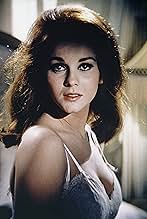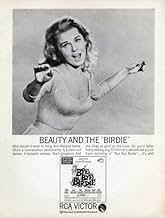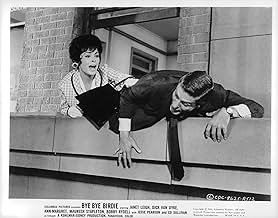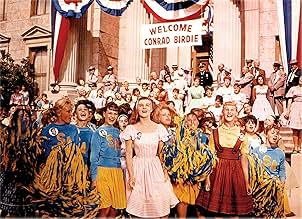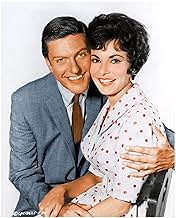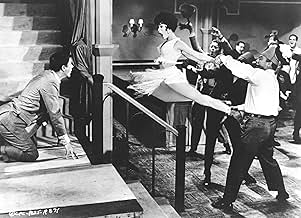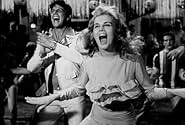Ein Rocksänger reist in eine kleine Stadt in Ohio, um seinen "Abschied" im Fernsehen zu feiern und seinen größten Fan zu küssen, bevor er eingezogen wird.Ein Rocksänger reist in eine kleine Stadt in Ohio, um seinen "Abschied" im Fernsehen zu feiern und seinen größten Fan zu küssen, bevor er eingezogen wird.Ein Rocksänger reist in eine kleine Stadt in Ohio, um seinen "Abschied" im Fernsehen zu feiern und seinen größten Fan zu küssen, bevor er eingezogen wird.
- Regie
- Drehbuch
- Hauptbesetzung
- Für 2 Oscars nominiert
- 7 Nominierungen insgesamt
Empfohlene Bewertungen
When Ann-Margret opens the film singing 'Bye bye Birdie' against a brightly colored backdrop you immediately feel yourself sucked back to a time when rock idols made their fans faint from excitement - literally! Although musical theater connoisseurs might argue about the cuts and changes made from the original play, what they can't argue is that this movie is what rock'n'roll movies are all about - lots of delirious FUN!!! Certainly, a widescreen classic like this is worthy of a wider re-release to theaters around the country, if only to see the extravagant production numbers in all their big screen glory. Of special note is Jesse Pearson's hip-swinging 'rock' idol 'Conrad Birdie', who first causes an entire town to swoon with "Honestly Sincerely," and then rocks the local juke joint with "Got a Lot of Livin' to do," which then spins off into multiple musical and dance directions. The artistic design is full of bright, primary colors that pop off the screen and make this a dazzling visual treat throughout. I do agree with naysayers that the whole 'speed-up' sequence at the end of the film is not only a disservice to the original story, but it also promotes the use of amphetamines (guess they didn't have any Nancy Reagans back then?). All in all, not perfect as movie musicals go, but a cinematic highlight if you are into rock'n'roll movies that send up the whole 'Elvis' myth in a comical way. Paul Lynde steals the show as a fertilizer salesman who must be swayed to let his daughter (Ann-Margret) kiss 'Birdie' on the Ed Sullivan show (and the REAL Ed Sullivan has a cameo too!). If you have a revival cinema or a local college with widescreen capabilities, tell them to give this new 35mm print a screening - looks FANTASTIC!!!
The vitriol below from fans of the Broadway original is absurd. Yes, this is not a filmed version of the stage play - GET OVER IT! What we have is a funny, smart, classic film musical that gets virtually everything right. Dick Van Dyke reprises his Broadway role while at the peak of his career, Paul Lynde gives his best film performance, Maureen Stapleton milks her part for all it's worth, and Ann-Margret is simply astounding! The only casting error is Janet Leigh - but they needed a name, since everyone else in the cast was unknown at the time. While Leigh gives a solid performance, songs had to be cut since she could sing only with difficulty. But this is a minor flaw - everything else about this film is spot on, as demonstrated by the sad effort to redo it for TV in 1995. It captures the era perfectly - of course, it's dated: it's about America in the early 60s! If it wasn't dated, it wouldn't work! So if you haven't seen it, get it - I just watched in in NYC's Bryant Park with thousands of jaded New Yorkers, and it won over that audience completely. Enjoy!
With the gift of a DVD by a good friend, I have now viewed BBB for the first time in over 20 years. And the comments here astound me: so many people coming to a message board to complain on a film that isn't a stage show. Or a book. Or an editorial. Different media sometimes (not always, to be sure) necessitate a change or alteration in a story adaptation. Yes, Rosie's ethnicity is down pedaled in the film (mainly because Chita Riviera wasn't in it), but they don't eliminate it entirely by the inclusion of a hideous black wig on Janet Leigh. I didn't miss Albert not being an English teacher as opposed to a chemist at all; it doesn't change the essence of his still-henpecked-by-his-mother character. On a different matter, I'm a little surprised to learn that Dick Van Dyke apparently had a bruised ego because of the strong emergence of co-star Ann-Margret in the film (his name still comes before hers, f'heaven's sakes!), but what can you do? The film is a fun, bright, pseudo-satire of the generation gap, teens, Elvis, and most of all, Ed Sullivan!! The finer numbers include the A-M introduction in "How Lovely to be a Woman" followed by the insane ensemble piece "Sincere-" which contains one of the funniest closing camera pans ever used in a film. "Kids" is also fine, but "Put on a Happy Face" is hampered by the limited dancing ability of Janet Leigh- through no fault of her own, mind you, but an obvious hole in what should have been a boy-girl dance duet (which they try to hide with excessive trick camera effects). The film's standout number, IMO, is "A Lot of Livin' to Do-" a nightclub extravaganza sung by THREE different leads advancing two different plots of the story at once. With stellar direction by George Sidney and inventive choreography by Onna White, it first appears as a conventional girl-swooning solo for the title character, but quickly shifts to the cat-and-mouse antics of torn lovers A-M and Bobby Rydell, who lead the entire club in a kind of challenge dance. And while it isn't her first film, this is the scene (for me, anyway) which shows A-M's breakout performance, dancing in a bare midriff and pair of hot-pink capris- and she blows the roof off the place. No surprise that the next year she was cast opposite Elvis himself. Check it out, and try not to break into dance yourself, I dare you!!
I really mean it. On the surface, it appears to be a funny, innocent, slap-happy musical. And it is - at least during the first half of the movie. Then it starts to wink at itself. I was ten when I first saw it, and though I enjoyed it a lot of it went way over my head. Watching it now, ten years later, I realize that BYE BYE BIRDIE is actually a smart, sophisticated satire that's not for kids.
The title character is Conrad Birdie, a vain, oily rock-'n'-roll star who's been drafted by the army. In fact, the movie focuses not so much on him as it does on the other characters - a songwriter and producer (Dick Van Dyke), his girlfriend (Janet Leigh), and a teenage girl named Kim (Ann-Margret). Forget Jesse Pearson, who plays Conrad; it's Van Dyke and Margret's movie all the way.
As I said, this film is actually a satire. There are so many in-jokes and jabs at the 1960s that watching it is almost like reading an issue of MAD or CRACKED magazine. In particular, the Cold War comes in for some heavy ribbing (this movie was made during 1962, the year of the Cuban Missile Crisis); the Soviets are made to look like pompous buffoons, with one guy even whacking himself in the head with his shoe (hint, hint). It's still pretty funny nearly four decades later, but I can imagine how much more of a punch it would have packed back during those foreboding times. In other scenes, the movie predates the style of John Waters by poking some fun at suburbia.
Lots of satire - and most of it decisively adult. You can bet that kids simply won't understand the scathingly sarcastic remarks delivered by Kim's Archie Bunkeresque father (Paul Lynde), or Kim's budding sexuality. And of course they're not going to be familiar with Ed Sullivan (himself). Still, there are lots of joyfully kinetic dance numbers and memorable songs (most notably "Going Steady," "Got a Lot of Livin' To Do," and the tune everybody remembers: "Put on a Happy Face"). Kids will want to fast-forward the VCR to the musical numbers, and also the funniest moment in the picture, which involves a glass of drugged milk and a ballet conductor.
An excellent, well-made, highly underestimated comedy, and infinitely superior to the made-for-TV version from 1995. So get a bowl of popcorn and check out this classic piece of popular culture. Just be prepared to explain a lot to the kiddies...
The title character is Conrad Birdie, a vain, oily rock-'n'-roll star who's been drafted by the army. In fact, the movie focuses not so much on him as it does on the other characters - a songwriter and producer (Dick Van Dyke), his girlfriend (Janet Leigh), and a teenage girl named Kim (Ann-Margret). Forget Jesse Pearson, who plays Conrad; it's Van Dyke and Margret's movie all the way.
As I said, this film is actually a satire. There are so many in-jokes and jabs at the 1960s that watching it is almost like reading an issue of MAD or CRACKED magazine. In particular, the Cold War comes in for some heavy ribbing (this movie was made during 1962, the year of the Cuban Missile Crisis); the Soviets are made to look like pompous buffoons, with one guy even whacking himself in the head with his shoe (hint, hint). It's still pretty funny nearly four decades later, but I can imagine how much more of a punch it would have packed back during those foreboding times. In other scenes, the movie predates the style of John Waters by poking some fun at suburbia.
Lots of satire - and most of it decisively adult. You can bet that kids simply won't understand the scathingly sarcastic remarks delivered by Kim's Archie Bunkeresque father (Paul Lynde), or Kim's budding sexuality. And of course they're not going to be familiar with Ed Sullivan (himself). Still, there are lots of joyfully kinetic dance numbers and memorable songs (most notably "Going Steady," "Got a Lot of Livin' To Do," and the tune everybody remembers: "Put on a Happy Face"). Kids will want to fast-forward the VCR to the musical numbers, and also the funniest moment in the picture, which involves a glass of drugged milk and a ballet conductor.
An excellent, well-made, highly underestimated comedy, and infinitely superior to the made-for-TV version from 1995. So get a bowl of popcorn and check out this classic piece of popular culture. Just be prepared to explain a lot to the kiddies...
I tend to agree with Alice from Orlando regarding this film. While "Bye Bye, Birdie" is a terrific film with terrific performances, viewed today, it's also a tribute to an era that we'll never get back. I completely agree with those historians who feel that 1953 - 1963, the ten year period between the end of the Korean War and that dark day in Dallas, was the last real "Era of Good Feeling" in American history. By and large, we knew who we were, what we were, and where we were going. Then came political assasination, the "Summer of Love," Viet Nam, Watergate, et. al., and we have a society that's not sure of anything anymore. Happily, there are films like "Bye Bye, Birdie," made during the apex of the 1953-63 period, to remind those of us who came of age during that era what we've lost, and to show those who weren't there what it was like. Would that we all had a Sweetapple, Ohio, to go back to again.
Wusstest du schon
- WissenswertesIronically, Bobby Rydell, who plays the timid Hugo Peabody, was himself a national teen idol before and after the film's production. In fact, in contrast to the original stage musical where Michael J. Pollard played the role, the part of Hugo was expanded significantly in the film to accommodate his teen celebrity.
- PatzerAfter Rosie pulls the McAfee family out of the audience at Toast of the Town (1948), two different shots of the Russian conductor show the McAfees still sitting in the audience.
- Zitate
Rose DeLeon: I must be the prized dope of all-time... thinking I could pry you away from your mama's ever-lovin' tentacles.
- Crazy CreditsThere is no "The End" credit or cast list at the end of the film. Ann-Margret simply sings an on-screen reprise of the song "Bye Bye Birdie" at the end, and then says " 'Bye, now!".
- VerbindungenEdited into Geschichte(n) des Kinos: Seul le cinéma (1994)
- SoundtracksBye Bye Birdie
Music by Charles Strouse
Lyrics by Lee Adams
Performed by Ann-Margret before the title credits, with Johnny Green and the Columbia Studio Orchestra and Chorus
Reprised by Ann-Margret in the finale
Top-Auswahl
Melde dich zum Bewerten an und greife auf die Watchlist für personalisierte Empfehlungen zu.
- How long is Bye Bye Birdie?Powered by Alexa
Details
- Erscheinungsdatum
- Herkunftsland
- Sprachen
- Auch bekannt als
- Adiós, ídolo mío
- Drehorte
- Produktionsfirma
- Weitere beteiligte Unternehmen bei IMDbPro anzeigen
Box Office
- Bruttoertrag in den USA und Kanada
- 13.129.412 $
- Laufzeit
- 1 Std. 52 Min.(112 min)
- Farbe
- Seitenverhältnis
- 2.35 : 1
Zu dieser Seite beitragen
Bearbeitung vorschlagen oder fehlenden Inhalt hinzufügen



